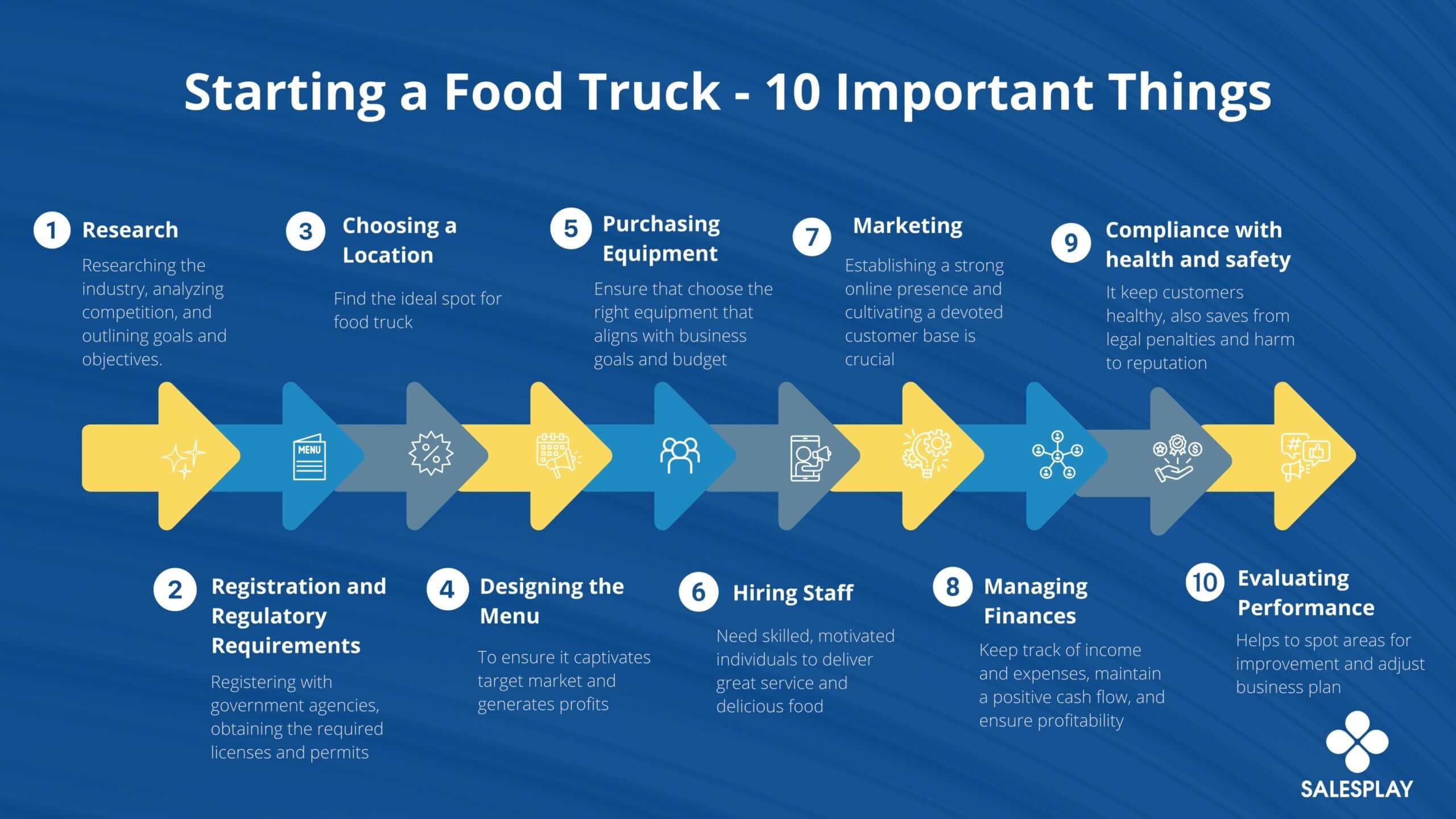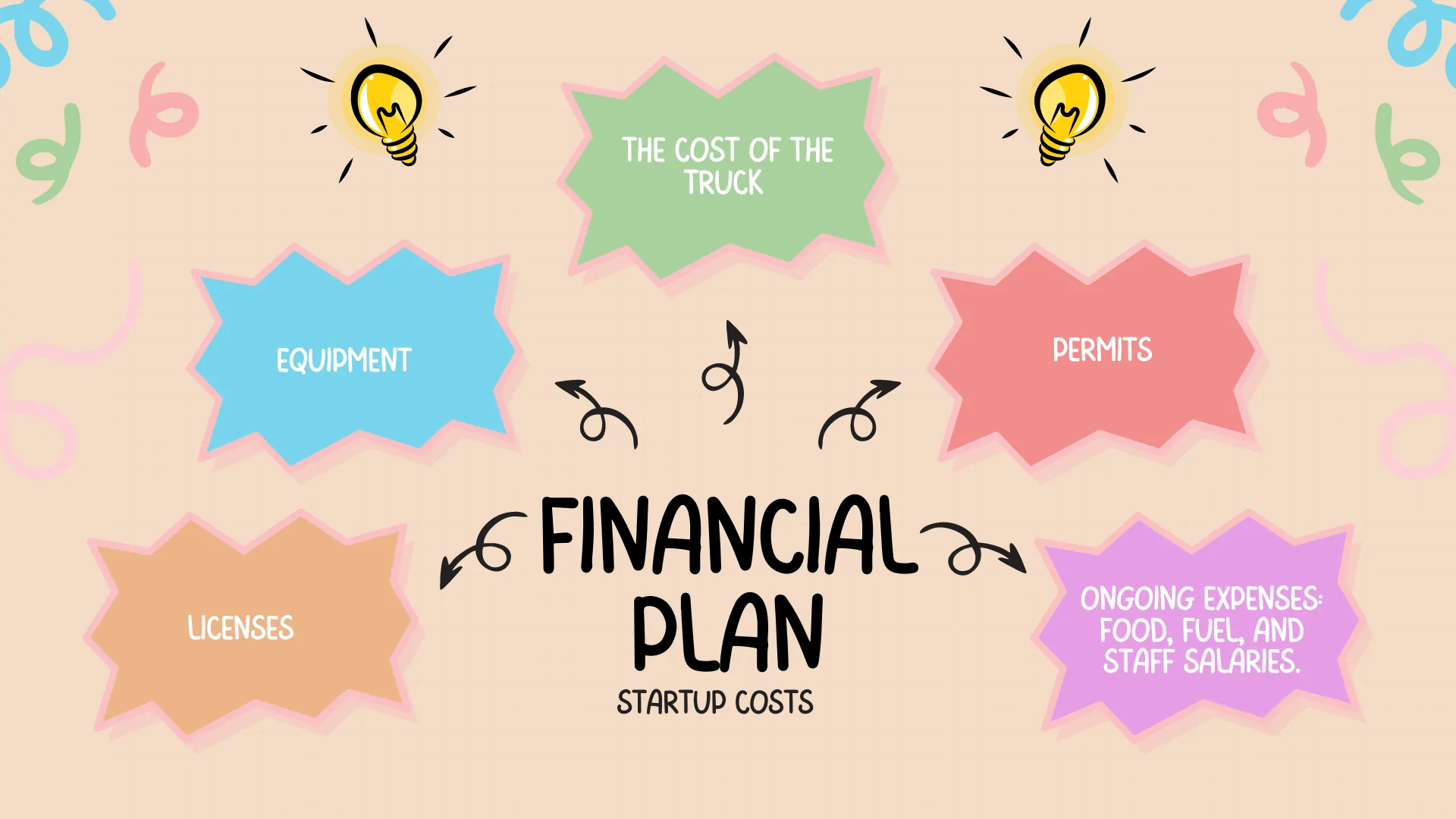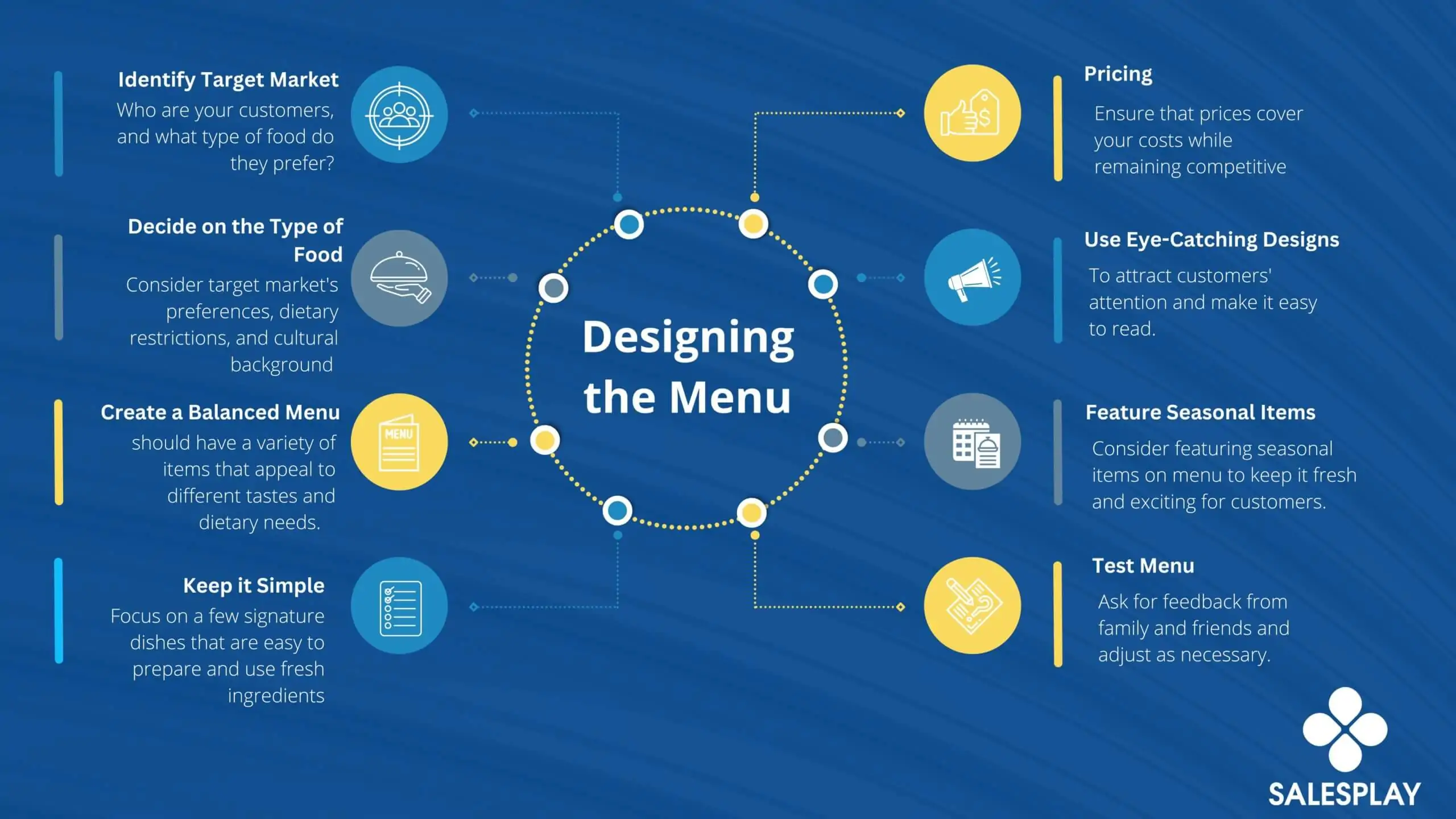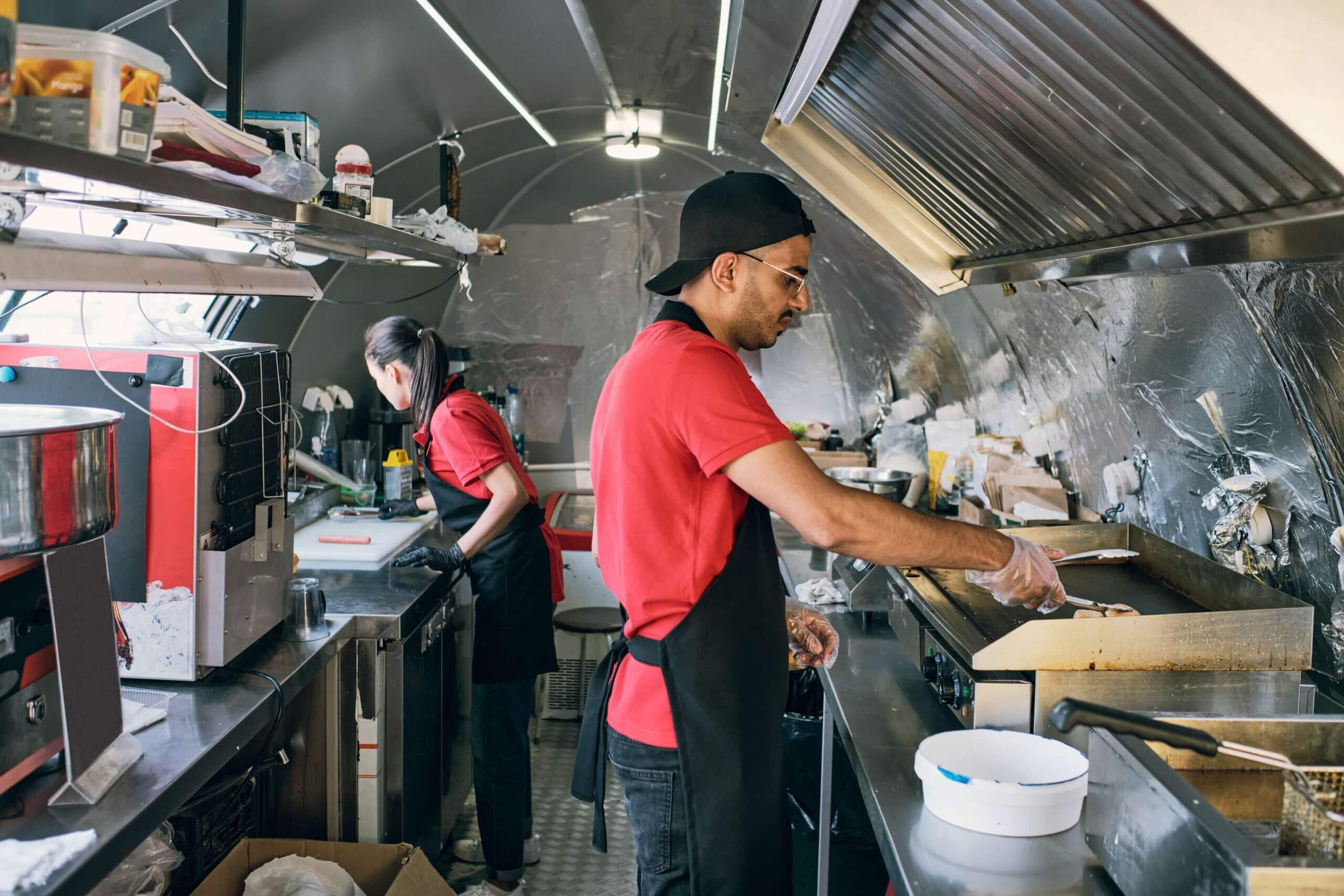Food trucks have exploded onto the culinary scene, proving a prosperous and popular way for food entrepreneurs to bring their delectable dishes to the masses.
But how do you actually start a food truck business?

This is what we are going to discuss in depth in this article and at the end of article we are talking about how food truck POS transform your business.
Buckle up and let's begin the journey towards creating an exciting and prosperous food truck business.

Starting a food truck business requires a well-developed food truck business plan that lays out the objectives and strategies to guide the business towards profitability.
But how do you go about developing a comprehensive business plan for your food truck?
In this section, we'll show you the steps involved in researching the industry, analyzing competition, and outlining goals and objectives.
The first step is to conduct thorough research on the food truck industry. This entails analyzing current food truck trends, successful business models, and popular cuisine types.
Additionally, you should familiarize yourself with local regulations and requirements, including permits and health and safety regulations.
After researching the industry, it's time to analyze the competition.
By studying other food trucks in your area, you can identify market gaps or niches that you can fill.
You should also pay attention to how they differentiate themselves and what they do to stand out from the competition.
With a good understanding of the industry and competition, the next step is to define your goals and objectives.
Your goals should align with your vision for the business.
Consider your target customers, the types of cuisine you plan to offer, and whether you want to be a seasonal or year-round business.
Knowing your target market is crucial to the success of your food truck business.
Identify the demographics of your ideal customers, such as age, gender, income level, and location.
Analyze their buying behavior and preferences when it comes to food to design a menu and create marketing strategies that appeal to your target market.
Your marketing plan should outline how you plan to reach your target market and promote your business.
Consider social media marketing, attending food truck events and festivals, partnering with local businesses or organizations, and running promotions or giveaways.
Discover expert strategies to craft an irresistible marketing plan for your food truck.
Creating a solid financial plan for your food truck is essential for long-term success. A well-structured financial strategy not only helps you track your cash flow but also ensures you're prepared for both growth and unexpected challenges.

Here’s how to get started:
A comprehensive financial plan ensures your food truck business runs smoothly, maximizes profitability, and sets you up for sustainable success.
Dive into Explore more on food truck financial plan and gain exclusive access to a ready-to-use template to kickstart.
Plan Your operations plan should outline the day-to-day activities of your food truck business, including menu planning, purchasing, food preparation, staffing, and scheduling.
You should also include information on your suppliers and vendors, as well as the technology and systems you will use to manage your business.
A well-executed plan can help you secure financing, attract customers, and ultimately achieve success.
By following these steps and conducting thorough research, you'll be able to create a plan that will guide you towards profitability.
Dive into essential strategies for crafting a successful food truck business plan.
Ensuring the legitimacy and compliance of your food truck startup is a pivotal step towards a seamless operation.
In this section, we’ll guide you through the steps of registering your food truck business with government agencies, obtaining the required licenses and permits, and registering for taxes.
Discover on organize food truck licenses and permits for a smooth and successful launch
Before initiating the registration process, it's imperative to conduct extensive research on the local regulations and requirements for food trucks in your area.
Such regulations may differ from state to state, and even from city to city, hence it's crucial to gain a clear understanding of the requirements in your locality.
Your research should encompass health and safety regulations, zoning laws, and permit requirements.
Explore on important regulatory requirements for food trucks in the USA.
The first step in registering your food truck startup is to register it with the appropriate government agency.
This typically entails registering your business with your state's Secretary of State office or similar agency.
Furthermore, you may need to register for a business license with your city or county.
Acquiring the necessary licenses and permits to operate your food truck business is the next step.
This usually involves obtaining a food service permit, allowing you to prepare and sell food, and a mobile food vendor permit, allowing you to operate a food truck.
Depending on your location and the type of food you plan to serve, you may also require additional licenses and permits, such as a liquor license or a permit to sell food in public parks.
As a business owner, registering for taxes is paramount.
This typically entails obtaining a tax ID number from the IRS and registering with your state's revenue agency to collect and remit sales tax.
You may also need to register for other taxes such as city or county taxes, depending on your location.
After registering your business, obtaining the necessary licenses and permits, and registering for taxes, it's crucial to maintain compliance with all applicable regulations.
This includes,
To summarize what we discussed in this section, registering your food truck startup is an essential step towards ensuring compliance with local regulations.
Researching local regulations, registering your business, obtaining licenses and permits, and registering for taxes will help establish your food truck as a legitimate, compliant operation.
Ensure to maintain compliance with all applicable regulations to avoid fines, penalties, and potential business closures.
Discover more on food truck licenses and permits to keep your business running smoothly.
Choosing the perfect location for your food truck can be a make-or-break factor in its success. Here is a guide to help you find the ideal spot for your food truck.
Before searching for a location, you need to understand your target market.
Who are your potential customers, and where do they usually go to eat?
Do they prefer street food or sit-down restaurants?
By identifying their needs, you can focus your search on areas that attract your target audience.

Be sure to check the local regulations in your area before scouting for locations.
Some areas may have restrictions on food trucks, so it's essential to know the rules before investing time and money into finding a location.
Look for locations with high foot traffic, such as popular street corners, parks, and tourist hotspots.
People are more likely to stop by your food truck if it's in a high-traffic area, increasing your chances of success.
Partnering with popular events like music festivals, fairs, and sporting events can give your food truck exposure to large crowds. This is an excellent opportunity to build your brand and expand your customer base.
Research the competition in the area and avoid locations with too many food trucks offering the same cuisine.
Look for gaps in the market where you can provide something unique that sets you apart from other food trucks.
When selecting a location, consider the surrounding area's safety, lighting, parking availability, and accessibility to public restrooms.
These factors can affect the number of customers who stop by your food truck.
Before committing to a location long-term, test it out for a few days.
Park your food truck in the area and observe how much foot traffic you get and how well your food sells.
This will give you an idea of whether or not the location is worth pursuing.
Learn the insider secrets of how successful food trucks find and choose the perfect locations.
In short, choosing the perfect location for your food truck is crucial to its success.
Understanding your target market, reviewing local regulations, scouting high-traffic areas, partnering with popular events, assessing competition, evaluating the surroundings, and testing your location will help you find the ideal spot for your food truck to thrive.
Explore some additional strategy too mange your food truck location.
Crafting a menu for your food truck is a pivotal aspect of your business that necessitates detailed consideration and strategic planning.
This is to ensure it captivates your target market and generates profits.
Here are the important steps to help you design the ideal menu for your food truck.

The first step in designing a menu is to identify your target market.
Who are your customers, and what type of food do they prefer?
Age, income, and lifestyle should all be considered when identifying your target market.
Once you have identified your target market, you should decide on the type of food to offer.
Consider your target market's preferences, dietary restrictions, and cultural background when selecting the type of food to sell.

A well-balanced menu should have a variety of items that appeal to different tastes and dietary needs.
Consider offering
Vegetarian
Vegan,
Gluten-free options
to cater to a broader range of customers. Ensure that your menu has a good balance of appetizers, entrees, and desserts.
If you want to offer a variety of items, it's crucial not to overcrowd your menu.
Keep it simple and focus on a few signature dishes that are easy to prepare and use fresh ingredients.
This approach will help you streamline your operations and ensure consistent quality.
Pricing your menu items is critical to the success of your food truck.
You need to ensure that your prices cover your costs while remaining competitive with other food trucks in the area.
Consider the cost of ingredients, labor, and overhead when pricing your menu items.
The presentation of your menu is just as crucial as the food you serve.
Use eye-catching designs and graphics to attract customers' attention and make it easy to read.
Keep the font size and style simple and legible.
Consider featuring seasonal items on your menu to keep it fresh and exciting for your customers.
Seasonal items add variety to your menu and can also help you save on ingredients.
Once you have designed your menu, it's time to test it before launching it.
Ask for feedback from family and friends and adjust as necessary.
You can also test your menu by offering it for a limited time and monitoring sales.
To catch up what we discussed in this section, crafting a menu for your food truck necessitates meticulous planning and strategic consideration.
Identify your target market and decide on the type of food to sell. Create a well-balanced, simple menu and price your items competitively. Use eye-catching designs, feature seasonal items, and test your menu. These steps will help you create a menu that captivates customers and drives business success.
Explore More on How Many Items Should Be on a Food Truck Menu: Create a Food truck menu
Starting a food truck business can be both exciting and daunting, and one of the most crucial steps is purchasing the necessary equipment.
However, this task requires a great deal of thought and planning to ensure that you choose the right equipment that aligns with your business goals and budget.
The first step in purchasing equipment for your food truck is to select the right vehicle.
This decision depends on factors such as the size and layout of the truck or trailer, as well as its mobility.
You also need to consider your cuisine type, target customer base, and the locations where you plan to operate. All these factors will help you choose the most appropriate vehicle that suits your business requirements.
After selecting the vehicle, the next step is to choose the right cooking appliances.
The type of cuisine you plan to serve will determine the specific equipment you need, such as grills, fryers, ovens, or stovetops.
However, you also need to ensure that the equipment is durable, easy to clean, and meets all safety standards.

Refrigeration and storage are vital components of your food truck business, and you need to keep your ingredients fresh and stored safely.
Therefore, you should consider purchasing refrigerators, freezers, and coolers that can maintain the right temperature.
Additionally, you need to ensure that you have enough storage space for your equipment, utensils, and supplies.
Your food truck's branding and signage play a crucial role in attracting customers and creating a lasting impression.
You should work with a graphic designer to create attractive signage and branding that reflects your business's personality and menu items.
This includes ensuring that your branding is visible from a distance and that your signage includes your menu and prices.
Budgeting and financing are also critical considerations when purchasing equipment for your food truck. You need to determine how much you can afford to spend on equipment and explore financing options such as loans or lease-to-own agreements.
While buying used equipment can help you save money, you need to ensure that the equipment is in good working condition and meets all safety standards.
Finally, you need to install and test all your equipment to ensure that it works correctly and complies with all safety standards.
Ensure proper installation of all equipment and compliance with safety standards. Before launching your business, it's essential to test all equipment to ensure that it works correctly and is in good working condition.
In conclusion, purchasing equipment for your food truck is a critical step that requires careful consideration and planning. By selecting the right vehicle, cooking appliances, refrigeration, and storage, you can ensure that your equipment meets your business's needs and complies with all safety standards.
Outfit your truck with branding and signage that reflects your business's personality and menu items and ensure that you have a solid budget and financing plan in place.
Finally, install and test all equipment before launching your business to ensure that it works correctly and meets all safety standards.
Explore more on in-depth food trucks equipment list and gear up for success of food truck business.
Hiring staff for a food truck business can be challenging. You need skilled, motivated individuals to deliver great service and delicious food.
Here's a comprehensive guide on how to hire and train staff for your food truck business.
Before you hire staff, you need to identify the diverse roles and responsibilities required for your food truck business.
Various roles in a food truck business may include:
Chef/Cook: responsible for crafting delectable menu items and managing the kitchen.
Server/Cashier: responsible for taking orders, handling cash, and serving customers with a smile.
Driver: responsible for maneuvering the food truck to different locations with safety and expertise.
Manager: responsible for overseeing daily operations, managing inventory and supplies, and providing exceptional customer service.
After identifying the roles and responsibilities, it's time to hire the right candidates.
Here are some tips to help you find the perfect candidates:
Advertise your job openings on various online job boards, social media, or local newspapers to attract a diverse pool of candidates.
Create a detailed job description that outlines the roles and responsibilities, required qualifications, and expected working hours.
Conduct interviews and ask relevant questions to assess the candidate's skills, experience, and work ethic.
Check references and conduct background checks to ensure that the candidate has a clean track record.

Once you've hired the staff, the next step is to train them on food preparation and customer service.
Training your team effectively is essential when starting a food truck business:
Develop a comprehensive training manual that outlines the food preparation process, safety protocols, and customer service standards.
Conduct on-the-job training sessions to teach your employees how to prepare menu items, handle cash, and interact with customers.
Use engaging role-playing exercises to simulate real-life scenarios and teach your employees how to handle challenging situations.
Provide ongoing training and feedback to help your employees improve their skills and performance continually.
The hiring and training of staff is a critical aspect of running a successful food truck business.
To hire the right employees, you need to identify the diverse roles and responsibilities required for your business, advertise your job openings on various platforms, conduct thorough interviews, and background checks.
To train your employees, you need to develop a comprehensive training manual, conduct on-the-job training sessions, and provide ongoing training and feedback.
With the right team in place, you can offer exceptional customer service and mouth-watering food, leading to the success of your food truck business.
Explore strategies to build a top-performing food truck team and elevate your business.
Marketing is an essential element of running a prosperous food truck business.
In this digital era, establishing a strong online presence and cultivating a devoted customer base is crucial.
Here are some tips to help you market your food truck business:
Before promoting your food truck, you must first create a marketing plan.
A marketing plan serves as a guide that outlines your marketing objectives, target audience, marketing channels, and budget. Here are some steps to create a marketing plan:
Identify your target audience and comprehend their requirements and preferences.
Develop a unique selling proposition (USP) that differentiates your food truck from competitors.
Choose the most effective marketing channels for reaching your target audience, such as social media, email marketing, or traditional advertising.
Set a marketing budget and assign resources to various marketing channels.
Explore on 10 food truck marketing ideas that will help your business stand out and drive more customers.
Social media is a mighty marketing tool that can help you reach a vast audience and cultivate a loyal customer base.
Here are some tips to develop a social media presence for your food truck business:
Select the social media platforms most popular with your target audience, such as Instagram, Facebook, or Twitter.
Create compelling and visually appealing content that showcases your menu, specials, and promotions.
Use hashtags to expand the visibility of your posts and reach a broader audience.
Engage with your followers by responding to comments, direct messages, and reviews.
Building relationships with local businesses and event organizers can help you reach a new audience and secure regular spots at popular events.
Here are some tips to build relationships with local businesses and event organizers:
Attending local events, food festivals, and farmers markets to network with other vendors and event organizers.
Offer discounts or free samples to event organizers, local businesses, or community leaders to build goodwill.
Collaborate with other local businesses or food trucks to organize joint events or promotions.
To summarize, marketing is an integral part of running a successful food truck business.

To market your food truck, you need to create a marketing plan, develop a social media presence, and build relationships with local businesses and event organizers.
With the right marketing strategy, you can attract new customers, build brand awareness, and grow your food truck business.
Here is a good case study of an extremely successful food truck business.
Effective financial management is crucial for the success of any food truck business.
It helps to keep track of income and expenses, maintain a positive cash flow, and ensure profitability.
Here are some tips to help you manage your finances effectively:
Establishing a bookkeeping system is fundamental to keeping track of your financial transactions.
Here are some essential steps to set up a bookkeeping system:
Choose a bookkeeping method that fits your business, such as cash basis or accrual basis accounting.
Record all sales and expenses using bookkeeping software or spreadsheet.
Keep all financial records accurate and up to date.
Separate personal and business finances by opening a separate bank account for your food truck business.
Effective cash flow management is vital for maintaining a positive cash balance and ensuring you have enough funds to cover your expenses.
Here are some tips to manage your cash flow:
Create a cash flow forecast to predict future income and expenses.
Regularly monitor cash flow to identify any cash shortages or surpluses.
Reduce expenses by cutting unnecessary costs or renegotiating contracts with suppliers.
Consider using cash flow management tools such as online invoicing or payment processing systems.
Explore more on cash flow management strategy to fuel the success of your food truck business.
Tracking expenses is essential for efficient financial management and ensuring business profitability.
Here are some tips to help you track your expenses:
Categorize expenses into different categories, such as food costs, equipment costs, and marketing expenses.
Record all expenses accurately and in real-time to avoid errors or omissions.
Use expense tracking software or apps to automate expense tracking.
Analyze expenses regularly to identify areas where you can cut costs or improve efficiency.
As discussed, managing finances is critical to the success of any food truck business.
To manage finances effectively, establish a bookkeeping system, manage cash flow, and track expenses.
By implementing the right financial management strategies, you can maintain a positive cash balance, ensure profitability, and grow your food truck business.
Explore 9 strategies to increase your food truck revenue and grow your business.
Making sure that your food truck business complies with health and safety regulations is an important part of its success.
Not only does it keep your customers healthy, but it also saves you from legal penalties and harm to your reputation.
Here are some tips to help you guarantee that your business complies with health and safety regulations:

Adhering to food safety guidelines is crucial to prevent foodborne illnesses and provide safe and healthy food for your customers.
Here are some tips to follow food safety guidelines:
Maintain the proper temperature for storing and cooking food.
Check expiration dates regularly and discard any expired products.
Clean and sanitize all surfaces, utensils, and equipment used for food preparation.
Store food to avoid cross-contamination between raw and cooked foods.
Keeping your food truck clean and hygienic is essential for preventing the spread of germs and bacteria. Here are some tips to maintain cleanliness and hygiene:
Wash your hands regularly and thoroughly with soap and water.
Wear clean and appropriate clothing, including hairnets, gloves, and aprons.
Clean and sanitize your food truck regularly, including all surfaces, utensils, and equipment.
Explore more on hygiene and safety standards for mobile food businesses for a clean, compliant, and successful operation.
It is essential to comply with local health and safety regulations to avoid legal penalties and protect the health of your customers.
Here are some tips to ensure compliance with local health and safety regulations:
Research local health and safety regulations and ensure that you comply with all requirements.
Obtain all necessary licenses and permits to operate your food truck.
Keep accurate records of your food preparation and storage processes.
Undergo regular health inspections to ensure compliance with local regulations.
Ensuring compliance with health and safety regulations is crucial for the success of your food truck business.
Follow food safety guidelines, maintain cleanliness, and comply with local health regulations to protect customers, avoid penalties, and build a positive reputation.
Evaluating the performance of your food truck is essential to ensure its success in the highly competitive food industry.
Regularly monitoring your food truck’s performance helps you spot areas for improvement and adjust your business plan for long-term success.
To help you evaluate your food truck's performance, here are some tips to consider:
It's crucial to monitor your food truck's performance regularly to detect areas that need improvement.
Here are some ways you can monitor your performance:
Track your sales data to identify any patterns or trends and make informed decisions about your business.
Collect customer feedback, reviews, and complaints to identify areas where you can improve customer satisfaction.
Check your food inventory regularly to ensure that you have enough ingredients on hand to meet the demands of your customers.
Analyzing sales data is critical to identifying trends and patterns that can guide you in making informed decisions about your business.
Here are some tips for analyzing your sales data:
Use your sales data to identify your most popular dishes and adjust your menu accordingly to cater to your customers' needs.
Analyze your sales data during different times of the day, week, or season to identify fluctuations in demand.
Compare your sales data to industry benchmarks to identify areas where you can improve and stay ahead of the competition.
Making changes to your business plan is essential to ensure the long-term success of your food truck.
Here are some tips for making changes to your food truck business plan:
Use your sales data and customer feedback to identify areas where you can improve your menu or service to meet your customers' needs.
Consider expanding your food truck's location or hours of operation to reach a wider audience and increase your sales.
Adjust your pricing strategy based on your sales data, customer feedback, and competition to remain competitive.
Evaluating performance is critical to the success of your food truck business. By monitoring your performance, analyzing sales data, and making changes to your business plan as needed, you can stay competitive and profitable in the food industry.
Explore Vital KPIs for drive food truck success and fuel your business growth
SalesPlay POS is your final destination in your quest for a suitable food truck point-of-sale (POS) system. Our solution is highly adjustable according to your business type and the nature of it. In the section below, we will help you understand how SalesPlay can help your food truck business.
Manage Your Sales Seamlessly- SalesPlay Free POS is available on Android and i-phone devices
Centralize Stock- SaleaPlay's ability to centralize stock allows you to connect more terminals to the server and enable to use single stock
Accept Payment from Any Method- Based on how your business works best you have the choice to accept cash or card payments with the SalesPlay POS.
Issue Printed Receipts or Email Receipt to Customer-Issue the bill in any way convenient to the customer or your online or your location-based busines via SalesPlay
Work Offline- Our solution allows you record sales even when offline
Shift Management- Enable Shift Management to reduce employee manipulations with SalesPlay POS
Automate Sales Commission Calculation-No more manual errors when calculating commissions in your business since SalesPlay is here to automate all the calculations.
In-Built Equipments- SalesPlay comes out with in-built bar code scanners, which makes you save the space inside of your food truck
Low Stock Reports-Automated low stock and stock expiry alerts are possible with SalesPlay POS system
Sales by Trend- Our POS solution helps you understand sales volumes by product to understand sales trend
Point based Loyalty-Run customer loyalty programme to reward repeat purchases through SalesPlay POS.
Learn more on SalesPlay POS and boost efficiency, sales, and customer satisfaction!
This article covered key factors for starting a food truck business, such as creating a business plan, choosing a niche, obtaining licenses, finding the right location, and marketing effectively.
We also emphasized the importance of conducting thorough research and planning to ensure that the food truck business is set up for success.
It also provides practical advice and tips to help aspiring food truck owners navigate the challenges and complexities of starting and running a successful business.
In conclusion, this article provides a useful guide for anyone interested in the food truck business and provides insight regarding how to start a food truck business. It covers key considerations and best practices that can help increase the chances of success for the business.
Food trucks can be quite profitable, but success depends on factors like location, menu, and management. On average, food truck owners can make anywhere from $250,000 to $500,000 annually, with some even earning more. However, it's important to remember that costs like permits, equipment, staff, and food supplies can eat into profits.
Your food truck’s profitability also depends on how busy you are. If you’re parked in a high-traffic area or at popular events, you could see higher earnings. Additionally, keeping your menu simple, fresh, and unique can help attract more customers and increase sales.
When it comes to food trucks, some types tend to rake in more cash than others. Gourmet food trucks that offer unique, high-quality dishes, like artisanal tacos, fusion cuisine, or gourmet burgers, often see higher profits. Customers love the novelty and are willing to pay a bit more for a special experience.
Coffee and dessert trucks are also big earners, especially in busy areas like parks or downtowns. People love grabbing coffee or sweet treats on the go. Pizza food trucks are another profitable choice, offering customizable options that appeal to a wide audience.
Finally, healthy food trucks are gaining popularity as people seek fresh, nutritious meals on the move. Whatever the niche, food trucks with a unique twist and a loyal following tend to make the most money!
Starting a food truck business is exciting, but before you hit the road, you'll need a few permits! First, you'll need a business license to operate legally in your area. Then, a food establishment permit is necessary to show that your truck meets health and safety standards.
Depending on your location, you might also need a mobile food vendor permit or a health department permit for inspections and ensuring food safety. Don't forget about fire permits if you're using cooking equipment like grills or fryers.
A parking permit might also be required, especially if you plan to park in specific spots. Lastly, you'll need liability insurance to protect your business. It might seem like a lot, but once you’ve got the permits, you’re ready to serve up delicious meals